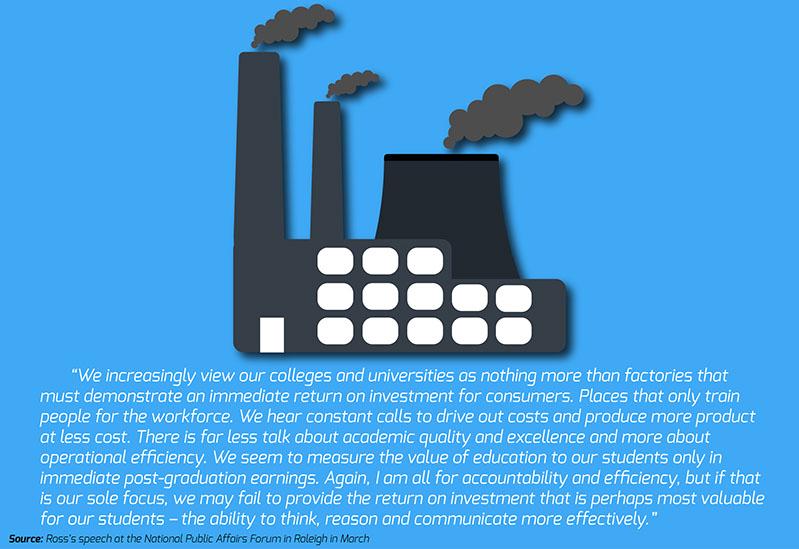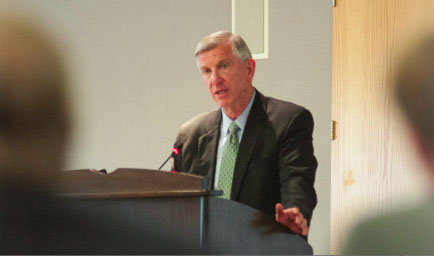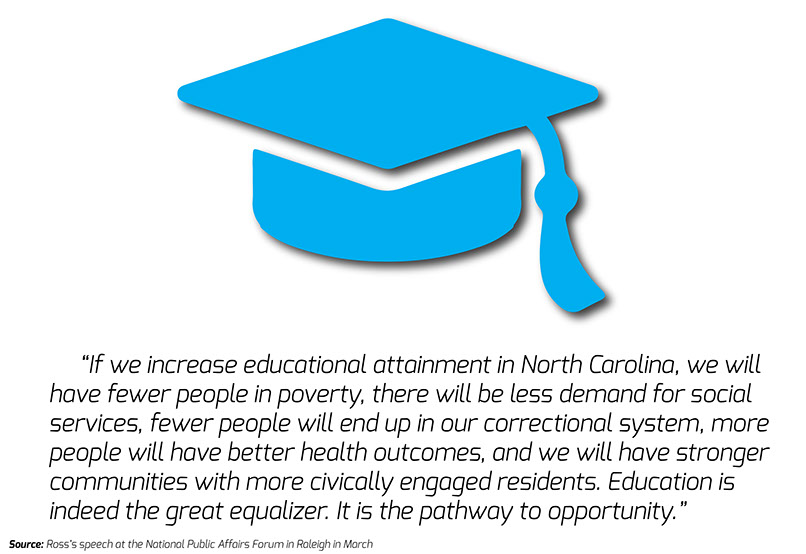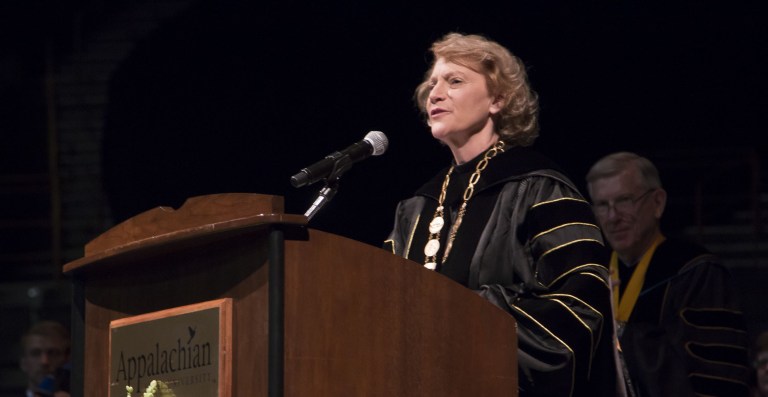Story by Michael Bragg, Enterprise Editor
Graphics by Malik Rahili, Visual Managing Editor
May 3, 2015
Tom Ross gave a speech in March that has given many in the higher education community and even those outside of it something to talk about.
During the National Public Affairs Forum in Raleigh, the University of North Carolina system president spoke openly about what he thinks of the current state of higher education in the state and nation. Ross talked about what ails it, why there needs to be more investment in a state system that took its largest cut in history under his watch and what is at stake if the value of higher education is depreciated.
“America is losing her way with regard to higher education,” he said in his speech. “We seem to have forgotten the real value of higher education – both to our economy and to our society. We have become too focused on metrics, return on investment and job preparation. I am not suggesting these are unimportant. Rather, I would remind us that higher education offers many other – and I contend greater – benefits to our nation and its citizens and communities.”
Ross said this, how the UNC system has thrived in an atmosphere of budget cuts — but urged that it can not benefit from that in the long run — and much more less than two months after it was announced his time as president will end the following year. The news was relayed during a press conference Jan. 16 with University of North Carolina Board of Governors Chairman John Fennebresque and Vice Chairman Lou Bissette with Ross sitting next to them while the decision was explained.
Above: Sheri N. Everts was installed as Appalachian State University’s seventh chancellor on Friday morning at Holmes Convocation Center. She has been the university’s acting chancellor since July 2014. Photo: Chris Deverell | The Appalachian
The upcoming change in leadership — and the way it was carried out by the BOG — in the UNC system, along with continual budget cuts and criticism of the board for micromanaging the 17 individual campuses of the system has not left the Old North State’s public higher education system in a favorable light across the state and even in the nation.
The governing body
The Board of Governors, much like Appalachian State University’s Board of Trustees, is a group of people charged with the task of overseeing the UNC system’s actions. The BOG’s 32 voting members are appointed to four-year terms by the N.C. General Assembly.
The BOG is composed of several different committees and asks the state legislature for the funding needed for the 17 individual campuses in the system, such as money for operations and salary increases for faculty.
Bissette is a North Carolina native who has been involved with higher education in the Tar Heel State from the time he was a college student to serving roles on different boards.
“I think it’s the best state system for higher education in the United States,” he said. “I think my goal, and I think the goal of the Board of Governors, is to keep it that way and to make it even better.”
Lately, the BOG’s recent actions have not reflected its “historical purpose,” said Andy Koch, Appalachian professor and the university’s former Faculty Senate chair. He and Frank Daniels, a now former member of the Appalachian BOT, both said the BOG is overreaching and micromanaging the individual campuses with actions such as the recent review of the campus centers and institutes and a proposed change to chancellor searches.
“What historically they have not done is micromanage the university system in a way to serve partisan political interests and I think we’re beginning to see that happen in the UNC system,” said Koch, who is also a member of the Faculty Assembly, an informal body comprised of faculty across the system, “and I think a lot of people who are paying attention to this are very concerned about it.”
In February during a BOG meeting at UNC Charlotte, a committee voted to close three centers across the UNC system out of 240 total. Those three voted on are a poverty center at UNC-Chapel Hill, a biodiversity center at East Carolina University and a civic engagement and social change center at North Carolina Central University, Inside Higher Ed reports.
The one that gained the most attention was the poverty center, which is run by Gene Nichol, a law professor at UNC who has been vocal about his dislike for the way state leaders have treated issues of poverty in the state, Inside Higher Ed reported.
Daniels said he did not think there was anything wrong with the review of the centers itself, but that the actions to close or keep them open should have been referred back to the chancellors of those campuses.
“I pretty much believe that they reviewed the centers because they wanted to get rid of Nichol and the poverty program,” he said. “They will say they didn’t but that’s their prerogative. They approved most of the centers, but that’s a form of micromanaging and I don’t think serves much purpose when they go in and say what to do.”
Bissette has commended the review and said they have established guidelines for the campuses to review their own centers and institutes in the future.
“There are lots of people on every side of these issues, but I thought the committee did a pretty good job in reviewing a large number of centers and institutes and coming down to some very reasonable recommendations,” he said.
Another criticism of the closure the poverty center was that there was no indication this would save taxpayer money since the center has not taken that kind of funding in order to operate since 2009, according to a statement from the UNC School of Law, where the poverty center has been housed since 2005.

There has also been a proposal from the BOG to make some changes to how chancellor searches are conducted at the university level, specifically the added presence the board would have.
Chancellor searches have traditionally been handled by the individual university’s BOT, which creates a search committee to give recommendations of the top three to five candidates to the system president. The president then has the option to select a finalist from the group to send to the BOG for approval, or the president decides the search committee should start over.
Proposed changes by the BOG would allow the board to appoint one of its own members to the search committee as a non-voting, advisory member, and that member could appoint one or two voting members to the board.
Koch said he’s surprised he has not seen much outcry or response from other BOTs across the system regarding the proposed changes. Koch said he sees that this plan “would essentially hijack the process from the local Boards of Trustees.”
“I would think that they would be very upset about that, yet the reaction has been very muted,” he said.
A lot of the criticisms of this board revolve around the accusation of political motivation. The BOG is overwhelmingly represented by Republicans, which in turn reflects the Republican majority of the state legislature.
But Bissette, who is a Republican, said politics have not been the case.
“Our fiduciary duty is to the UNC system and not to any other entity, even though we’re all elected by the legislature,” he said.
Bissette acknowledged that politics can potentially have some involvement in the various actions of the BOG, based off the fact that members are appointed by the state legislature, but that that’s how it’s always been.

He also mentioned times in the past where the state legislature was controlled by Democrats, which reflected the makeup of the BOG at that time. Bissette said the representation of the BOG now with its most recent additions has “broadened.”
“I think we’re making some progress,” he said. “We’re no more political than the Board of Governors has ever been in my estimation.”
But Koch is one of the many people who believe politics has a large presence when it comes down to decision making, especially when the BOG is “willing to reach down to the individual campuses and micromanage them.”
“I’ve never seen it before,” he said, “and I think that this is an indication that not only is this Board of Governors willing to micromanage the campuses, but it’s also a highly politicized group who is willing to reach down and close institutes and centers that they don’t like, where they don’t like what they’re doing at those centers.”
Koch said it’s hard to believe some of these actions by the board are not politically motivated in some way and that they can claim otherwise.
“I mean, they must think that people aren’t paying attention,” he said. “I mean that’s their public press persona. ‘Oh we’re not political,’ well then why the hell did they reach down and close the poverty center at the UNC law school? It wasn’t to save money, that thing is privately funded… The evidence is clear.”
But one of arguably the biggest and most noticed actions involving the BOG and UNC system recently has been the announcement of Ross’s upcoming departure.
Tom Ross, president of the North Carolina school system, addresses the chancellor search committee at a meeting at Appalachian State in August 2013. File Photo | The Appalachian
‘He was fired’
In January, an announcement was made that Ross was stepping down as the president of the UNC system, a decision made by the BOG. Ross will serve until January 2016 — or later until a new president has been selected — and the search for his predecessor is beginning to take form.
The announcement was abrupt, and the press conference showed exchanges between Fennebresque and members of the press as he explained several times that the decision was not politically motivated and why the decision was made. He also mentioned that age was not a factor in the decision, although it has been common for past presidents to step down at age 65 — Ross is 64.
“I think the board felt like at the appropriate time there should be a transition to a new president,” Fennebresque said at the press conference, “and we had a timeline that we were thinking along and President Ross had a different timeline and that’s it.”
Ross answered a few questions during the conference as well.
“When I came here I made it clear that I wasn’t going to be ready to stop working at age 65 and I’m not ready to stop working at age 65,” he said at the press conference. “So I don’t know how much longer but I wasn’t planning to leave in the near future, but I think the board did have a different timeline and I respect their right and their prerogative to select the president.”
Both Fennebresque and Bissette commended Ross for his work several times during the press conference.
Cameron Carswell, an Appalachian alumna and executive administrative specialist to the office of the president at the American Council on Education in Washington, D.C., worked with the BOG and Ross during her time as president of the Association for Student Governments during the 2012-13 academic year. After seeing the video of the press conference, she called the action a political move.
“I don’t think that Tom chose to leave and I think it’s very evident that he’s disappointed that they think this is an appropriate next step,” Carswell said.
Koch called Ross’s announcement and the BOG’s involvement in that decision a euphemism for what really happened.
“Well, he was fired,” Koch said. “He was removed by the Board of Governors and they don’t want to say that.”
Koch said he doesn’t believe Ross would have made the speech on higher education and the UNC system back in March if this announcement had not been made.
In his speech, Ross spoke highly of the importance of higher education for the nation and North Carolina and did not hold back on his criticisms either. Speaking on budget cuts and concerns that the only product of a graduate should be someone with the ability to get a job, Ross agreed with “accountability and efficiency,” but that should not be the only focus and outcome for students.
“We increasingly view our colleges and universities as nothing more than factories that must demonstrate an immediate return on investment for consumers. Places that only train people for the workforce” he said in his speech. “We hear constant calls to drive out costs and produce more product at less cost. There is far less talk about academic quality and excellence and more about operational efficiency. We seem to measure the value of education to our students only in immediate post-graduation earnings.”

Daniels, who once served on the BOG, said, political idealogy aside, that this group just needs more experience and time to make better decisions for the UNC system.
“Overtime, I believe that they will change the way that they are operating — I hope they will — and I really don’t think that it makes a difference what political party it is,” Daniels, a Democrat, said. “I hope it doesn’t.”
Carswell said that in Ross’s absence, no matter who takes over next, that the UNC system will adapt, as it has during financial woes and continual budget cuts.
“We’ll do what we have to do to survive, but is surviving really thriving? Is surviving really the way that the UNC system’s legacy lives on? We’ve never been known with the reputation of merely scraping by,” she said. “And do we want to embrace that repute now?”
Bissette said the BOG plans to go to the General Assembly this summer and ask the state legislature for as much money as possible to fund the operations of the state’s public higher education system.
“I think the UNC system is the most important entity and resource that we have in North Carolina and it’s the reason that North Carolina is such a successful state today,” he said. “And I for one intend to keep it that way, and I think your Board of Governors feel the same way.”
Koch said he hopes the future actions by the BOG will include ways to properly fund the universities in the system, pay faculty competitive salaries and that they micromanage the campuses less.
“I’m not hopeful any of that is going to happen, I just don’t believe it, not in this current political climate,” he said. “At the same time, that’s the kind of thing that has to happen in order for this system to reverse course.”
Ross ended his speech in March by talking up the importance of investing in higher education and reminded policymakers that it is important they do the same.
“The stakes are high for North Carolina and for our nation. I certainly hope that you will partner with the university and with me during the remaining time of my watch to share this important message.”

